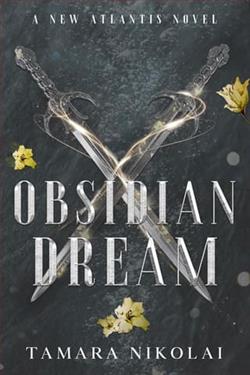Page 41 of The Last Stars in the Sky
I realize she has a point. I stare into the fire, the glowing embers shifting and already starting to die out, their edges whitening into ash. “We don’t have enough food to last until spring,” I tell her quietly. “It’s hard to have faith when I’m facing that. I don’t want to watch my children starve.” Darlene is silent, and I turn to look at her. “What do you think I should do?” I ask bleakly.
She’s silent for a long moment. “You don’t have to starve,” she says at last. “God knows. I grew up in these woods, and our cupboards were much barer than yours are, honey. We didn’t starve.”
“But you could go to the grocery store and buy something,” I feel I have to point out.
She gives me a quiet, knowing look. “Not always,” she says, and I feel ashamed. I knew Darlene grew up poor; everyone around here grew up poor. But I didn’t really think about it much more than that.
“So, what should I do?” I ask again. “I could learn to hunt, maybe.” I speak dubiously because I have only nicked that damned tin can once. Mattie is a better shot than I am. Maybe she can hunt, if Darlene can teach us, which, considering the state of her health, she probably can’t.
“You could,” Darlene agrees, sounding as dubious as I did, “but fishing and trapping are better options. Kerry should have taken some traps from my place. I had some, anyway.”
“I don’t know to trap.”
“There’s not much to it.” She shrugs, smiling; there is the faintest trace of gentle derision in her eyes, at how obviouslyfeeble I’m being. “You set the trap, and you put it out somewhere in the woods. Then you go back to check it out, hopefully before something else does.”
She makes it sound so simple, but I don’t think it can be. “Okay…” I say after a moment.
“And you don’t mind too much, about eating rabbit or squirrel or beaver,” she adds, a definite note of amusement in her voice, and I swallow hard.
Beaver? “I don’t mind,” I say.
Darlene lurches forward, alarming me with the sudden movement, but then she simply takes my hand in her soft, plump one. “Your dad would be proud of you, Alex,” she says quietly.
Again, I have to swallow. Try to speak, even though it’s hard. “I don’t know that he would, Darlene,” I manage. “I don’t know how to do any of this. I don’t really want to learn.” At least, I don’t want to have to learn. I don’t want this to be my life, my children’s lives. What future is there for any of us?
“And your dad would say it’s not about knowing something, but admitting what you don’t know and being willing to learn it,” Darlene replied steadily. “It’s not about succeeding, but being willing to try, fail, and then try again.”
She sounds so much like my dad, it’s as if I can hear his voice. He is in the room with us, right now; if I turn, I’ll see him in the recliner in the corner, his gaze cast to the ceiling as he makes such a pronouncement, his tone kindly and reflective, a small whimsical smile curving his mouth.
I try to thank her, but I can barely speak, and Darlene seems to understand. She squeezes my hand and then she lets go, leaning back into her chair with a groan.
The next morning, I’m ready to work. To try. I make oatmeal—half a cup each, with water, which feels like nothing—and I smileat Mattie and Ruby as I give them their breakfast. To their credit, they don’t turn their noses up at the watery gruel, sprinkled with a scant quarter-teaspoon of brown sugar. They simply reach for their bowls and start eating.
“We’re going to do stuff today,” I tell them, and Mattie looks instantly alert, Ruby wary. “We need to figure out a way to find more food,” I continue. “Darlene is going to show us how to set traps.”
“Traps,” Mattie repeats thoughtfully, and Ruby’s eyes widen.
“Trap animals?” she asks in a horrified whisper, and belatedly I realize that my animal-loving eleven-year-old—last year for her birthday she asked for a donation to be made to the Worldwide Fund for Nature—might not take kindly to the idea of trapping animals and then eating them.
“We have to, Rubes,” Mattie says before I can think how to reply. “Because we need to eat. It’s quick and painless, I promise.” I’m not sure it actually is, but I certainly don’t say that. Mattie gives Ruby a reassuring smile, but my youngest child doesn’t look convinced. She eats the rest of her pathetic breakfast in silence.
“Does Darlene have, like, actual traps?” Mattie asks curiously once we’ve washed and dried the dishes. Neither Kerry nor Darlene have made an appearance yet this morning, but it’s not yet eight o’clock. For some reason, we’ve all become early risers. I was up at six, hauling water from the lake; the ice is thick enough now that I need an axe to hack through it, and there are several inches of snow, dusting the trees, softening the stark and leafless branches, the hard, frozen ground.
“Yes, I think so. She said she had some back at her place, and we brought pretty much everything she owned from there.”
“And she knows how to set a trap?”
“I hope so,” I reply with a smile, “because I certainly don’t.” Along with a lot of other things. “I don’t know how to skin a deeror weave a basket or can fruit,” I tell Mattie wryly. “Or…” I try to think of some other skill that belongs inLittle House on the Prairie. “I don’t even know what I don’t know,” I finish on a sigh. “But if I did, I’d try to learn it.”
Mattie smiles back at me, and I’m heartened, but then Ruby makes a sound like a small animal—something between a gasp and a squeak—and runs out of the kitchen.
I sigh, trying to curb my worry. Mattie glances at me, a frown settling between her brows, a question in her eyes.What now? In response I give a little shrug.I don’t know.
Then Ruby returns, holding an ancient-looking book, its cover and its pages tattered, almost falling out. It’s a paperback, the size of a textbook, and as she comes closer, I realize I recognize it—it’s been on the bottom shelf of one of the bookcases built around the fireplace, made from the weathered wood of the old barn; my parents must have bought the book when they first built this place, back in the seventies. Ruby is holding it like an offering, like it’s the Holy Grail.
“Rubes?” I ask uncertainly, and she holds the book out to me. I take it and read the title out loud. “The Complete Book of Self-Sufficiencyby John Seymour.” I open and read some of the table of contents with a growing sense of wonder—“The way to self-sufficiency. The one-acre holding. The food-producing garden.” There’s absolutely everything in here. It’s like having the internet at my fingertips, but maybe even better. “Ruby. How did you find this book?” I know it’s been on the same shelf for about forty years, but why did she even take a look at it? We didn’t inventory the books; I didn’t see the point, which I realize now might have been a huge oversight.
She shrugs, and I think of how for the last week she has always been reading, losing herself in the world of books as she so often does. I thought she was skimmingArchiecomics; it turns out she might have been doing something far more useful.















